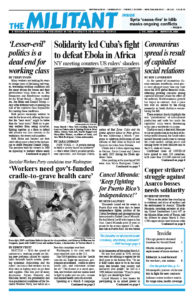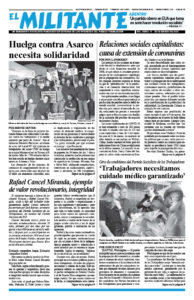Many workers are looking for ways to change years of declining real wages, worsening working conditions and the many abuses the bosses and their governments bring down on us. But Democrats and Republicans tussling for the White House –— Bernie Sanders, Joe Biden and Donald Trump — only offer different ways to prolong the rule of the capitalist class responsible for creating these conditions.
Both parties encourage workers to vote for the lesser evil, offering the hope that the “least worst” might be better than the “most worst.” Both try to prevent workers from seeing ourselves, fighting together, as a force to defend and advance our class interests in the workplace, the streets and in politics.
Both Biden and Sanders say their chief selling point is they’re the best person to defeat President Donald Trump. The president built his victory in 2016 on appealing to workers whose needs were ignored by Washington and called for “draining the swamp.” He now claims he is responsible for a “blue-collar boom.”
Biden is consolidating his lead over Sanders in the Democrats’ preconvention voting as the other centrist candidates have dropped out and endorsed him. He says he is the best, most realistic, choice to beat the president.
Sanders denounces both Democratic and Republican “establishments” for failing to provide working people with what they require. He says what workers need is a bigger and bigger government, like that run by Franklin Delano Roosevelt, that will regulate the capitalist system in a more benevolent manner.
By contrast, Alyson Kennedy and Malcolm Jarrett, the Socialist Workers Party candidates for president and vice president, point to what working people ourselves can become when we organize and fight together in our own class interests. It is only through working-class struggles — on the job and beyond — that workers gain self-confidence, become more battle-ready and see more clearly we are a class with common interests that are separate from the bosses and bankers that exploit us.
Can we advance working-class struggle?
The real question workers face is how can we advance the struggles we wage, big or small, against what the bosses do to us. How can we link up in solidarity with others fighting today. And how can we strengthen the position of our class by building our own party, a labor party, as our struggles grow. Such struggles are an inevitable product of the deepening crisis of capitalism today. The capitalist lesser-evil electoral setup is a pressure valve the rulers use to entice workers to blow off some steam at the ballot box every few years, rather than rely on ourselves and deepen our struggles.
Over decades the employers have succeeded in driving real wages down, taking advantage of the fact our union officials focus on deals of “common interest” with the bosses — an impossibility under capitalism. They —reject mobilizing the ranks of the unions to fight.
Average hourly wages grew by just 1% last year, yet inflation over the same period ran at 2.3%. And those with the lowest pay shell out a much higher proportion of our wages on basic necessities like rent, food, transportation and a little health care, whose prices are rising even faster.
Almost half of everyone in the U.S. lives paycheck to paycheck today, and even more don’t have any savings to fall back on in case of an emergency.
Household debt reached a record high of $14.15 trillion last month, a boon for the capitalist bloodsuckers — as long as they can collect. Last year more people fell behind on credit card, auto and student debts, something bound to accelerate with an economic downturn.
Low wages, mounting debts and rising rents are forcing more young workers to live with their parents, put off getting a place of their own and starting a family. Life expectancy in the U.S. began falling in 2015, largely the result of depression, drug use and suicides.
Side by side with their assaults on wages, the bosses’ drive for profits makes them push ever more dangerous conditions onto workers in the mines, on the railroads, in retail stores, warehouses and other workplaces. None of this will end, whichever of the bosses’ parties takes the White House.
The union officials insist workers should look to the bosses’ parties for help. They tell us to be “realistic” in politics — and in negotiations.
Officials of the American Federation of Teachers; National Education Association; the American Federation of State, County and Municipal Employees; and the Service Employees International Union are hustling to get more of their members elected as delegates to the Democratic Party’s July convention, to “have more clout.” They’re offering financial inducements to attend.
And if Sanders loses the nomination and some of his backers decide to spin off a new, more “radical” capitalist party — it will just mean a three-party shell game.
Getting workers to orient to capitalist electoral politics does nothing to advance the organization of the working class — something that can only occur as a product of working class action.
Only the Socialist Workers Party candidates point to the fights working people can be part of today and how we can use solidarity to strengthen these struggles.
They explain why workers need their own labor party, based on union struggles, to implacably fight for the interests of all the exploited and oppressed. The SWP candidates say workers need to take on every attack and indignity the bosses and their governments impose on us and build a movement that can put an end to their class rule.
They point to the example of the Cuban Revolution, where workers and farmers overthrew the U.S. imperialist-backed dictatorship of Fulgencio Batista and made the first socialist revolution in our hemisphere. That revolution lives today, something to learn from and emulate.
Like Cuban workers and farmers, in the course of our struggles we’ll gain the class consciousness and the capacity to run society ourselves.

